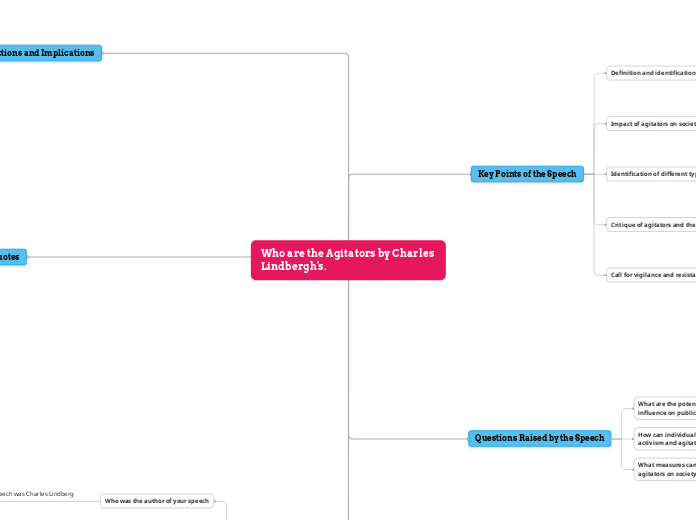Who are the Agitators by Charles Lindbergh's.
Key Points of the Speech
Definition and identification of "Agitators"
Definition of an "Agitator"
Characteristics and behaviors of agitators
Impact of agitators on society
Disruption of social order
Influence on public opinion
Identification of different types of agitators
Political agitators
Social agitators
Critique of agitators and their methods
Manipulation of emotions and fear
Use of propaganda and misinformation
Call for vigilance and resistance against agitators
Importance of recognizing and countering agitators
Upholding democratic values and principles
Questions Raised by the Speech
What are the potential consequences of agitators' influence on public opinion?
How can individuals differentiate between legitimate activism and agitator tactics?
What measures can be taken to counter the influence of agitators on society?
Connections and Implications
Connections to the present day
Similarities between historical agitators and modern-day influencers
Impact of social media on the spread of agitator tactics
Self-reflection and personal responsibility
Examining our own susceptibility to agitator tactics
Taking proactive steps to resist manipulation and misinformation
Societal impact and the preservation of democracy
Recognizing the importance of a well-informed and engaged citizenry
Safeguarding democratic institutions against agitator influence
Quotes
But three important groups have been pressing this country toward war: the British, the Jewish, the Roosevelt administration.
First, the British: It is obvious and perfectly understandable that Great Britain wants the United States in the war on her side
The second major group I mentioned is the Jewish
The Roosevelt administration is the third powerful group which has been carrying this country toward war.
Our people stood united on a program of defence. And then began a refrain that marked every step we took toward war for many months
Questions part 5
Who was the author of your speech
The author of my speech was Charles Lindberg
When did this speech take place, and what happened before this took place?
The speech was given on september 11th, 1941. This speech was given during the second world war.
Who was the original intended audience?
The original intended audience of the speech would likely have been the American public. Lindbergh delivered this speech during a period of intense debate and uncertainty regarding the United States' involvement in World War II. As such, his aim was likely to sway public opinion against entering the war and to rally support for maintaining neutrality. topic
Did anything significant happen to the author of this speech afterwards?
After delivering the controversial speech titled "We Are the Agitators," Charles Lindbergh faced significant backlash and controversy. His views, particularly regarding his opposition to U.S. involvement in World War II, were widely criticized by many Americans, including political leaders and prominent figures. Lindbergh's reputation suffered, and he became a polarizing figure, with some viewing him as a patriot defending American interests and others condemning him as an isolationist or even sympathetic to Nazi Germany.
Consider your five quotes above. What do you think the “big idea” is of this speech is? What was the author trying to say?
The "big idea" of the speech appears to be a staunch opposition to U.S. involvement in World War II. Lindbergh argues vehemently against the pressures from various groups to enter the conflict, including the British, Jewish, and Roosevelt administration. He portrays these entities as "war agitators" who seek to draw the United States into a war that he perceives as detrimental to American interests and contrary to the nation's tradition of neutrality.
